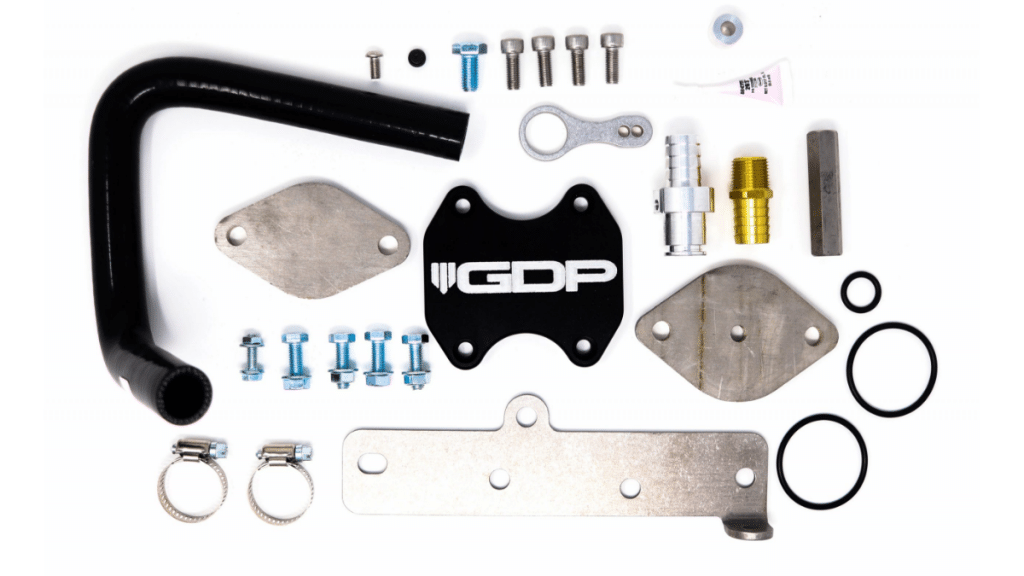Performance and reliability are paramount considerations for diesel engine enthusiasts and professional drivers. One familiar modification owners of 6.7 Cummins engines seek is removing the exhaust gas recirculation (EGR) system. In this comprehensive guide, we’ll delve into the intricacies of EGR removal for 6.7 Cummins engines, exploring the reasons behind this modification, the benefits it offers, and the role of EGR delete kits in achieving optimal engine performance.
Understanding EGR Removal for 6.7 Cummins Engines
What is EGR Removal?
EGR removal involves disabling or eliminating a diesel engine’s Exhaust Gas Recirculation (EGR) system. The EGR system recirculates a portion of exhaust gases back into the engine’s intake manifold, reducing nitrogen oxide (NOx) emissions while introducing carbon deposits and reducing engine performance over time. EGR removal 6.7 Cummins seeks to improve engine performance, reliability, and efficiency by eliminating this recirculation process.
Reasons for EGR Removal
Improved Engine Performance: Eliminating the EGR system can enhance engine performance, increasing horsepower, torque, and throttle response.
Reduced Carbon Buildup: The EGR system is prone to clogging and carbon buildup over time, which can restrict airflow and reduce engine efficiency. Removing the EGR system mitigates this issue.
Enhanced Engine Longevity: Without the EGR system, the engine operates under cleaner conditions, reducing the risk of component wear and prolonging its lifespan.
Simplified Maintenance: EGR removal eliminates the need for periodic cleaning and maintenance of EGR components, saving time and money on repairs.
Benefits of EGR Removal
Increased Power: Removing the EGR system allows the engine to breathe more freely, increasing power and torque output.
Improved Fuel Efficiency: Eliminating exhaust gas recirculation allows the engine to operate more efficiently, leading to potential fuel savings.
Enhanced Reliability: EGR removal reduces the risk of engine issues related to carbon buildup, such as stuck EGR valves or clogged EGR coolers, improving overall engine reliability.
Cleaner Intake System: Without exhaust gas recirculation, the intake system remains cleaner, reducing the buildup of carbon deposits and contaminants.
EGR Removal Methods
Mechanical Block-off Plates: One method of EGR removal involves installing block-off plates to seal off the EGR ports on the intake manifold and exhaust manifold, preventing exhaust gases from entering the intake system.
Electronic Tuning: Some EGR removal methods utilize electronic tuning devices or engine control unit (ECU) remapping to reduce EGR-related functions and prevent error codes or warning lights.
Legal and Environmental Considerations
Emissions Compliance: Removing emissions control components, including the EGR system, may render the vehicle non-compliant with federal and state emissions regulations. Before proceeding with EGR removal, it’s essential to consider the legal implications.
Environmental Impact: EGR removal can increase nitrogen oxide (NOx) emissions, contributing to air pollution and ecological degradation.
Warranty and Insurance: EGR removal may void the vehicle’s warranty and impact insurance coverage. Before proceeding with this modification, it’s essential to consult with the manufacturer and insurer.
Exploring EGR Delete Kits
What are EGR Delete Kits?
EGR delete kits are aftermarket components designed to facilitate removing or bypassing the EGR system in a diesel engine. These kits typically include block-off plates, hardware, and sometimes electronic tuning devices to turn off EGR-related functions in the engine control unit (ECU).
Components of EGR Delete Kits
Block-Off Plates: These plates seal the ports where the EGR system components are connected, preventing exhaust gases from entering the intake manifold.
Hardware: Necessary bolts, nuts, and gaskets to ensure a secure and leak-free installation.
Electronic Tuning Device: Some kits include a tuner or programmer to reprogram the ECU, turn off EGR-related functions, and prevent error codes.
Installation Process for EGR Delete Kits
Preparation: Gather all necessary tools and components. Ensure the engine is excellent before starting the installation process.
Disconnect Battery: To prevent electrical hazards, disconnect the vehicle’s battery.
Remove EGR Components: Carefully remove the EGR valve, cooler, and associated components according to the kit’s instructions.
Install Block-Off Plates: Securely install the block-off plates to seal the EGR ports, ensuring a tight fit.
Reprogram ECU (if applicable): Use the tuner or programmer to update the ECU, turn off EGR-related functions, and prevent error codes.
Final Inspection: Check all connections and components to ensure proper installation and functionality.
Maintenance Tips for EGR Delete Kits
Regular Inspections: Periodically inspect the EGR delete kit components for signs of wear, corrosion, or loosening.
Tighten as Needed: If any components become loose over time, tighten them to ensure a secure installation.
Replace if Damaged: If any components show signs of significant wear or damage, replace them to maintain the integrity of the EGR delete system.
Conclusion
EGR removal for 6.7 Cummins engines offers enthusiasts and professional drivers an opportunity to enhance engine performance, reliability, and efficiency. By eliminating the restrictive EGR system, drivers can experience increased power, improved fuel efficiency, and reduced maintenance requirements. However, it’s essential to consider the legal, environmental, and warranty implications of EGR removal before proceeding with this modification. With EGR delete kits and careful installation, enthusiasts can achieve the benefits of EGR removal while ensuring compliance with regulations and preserving the integrity of their vehicles.
